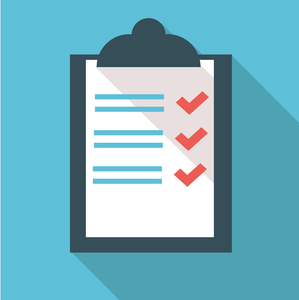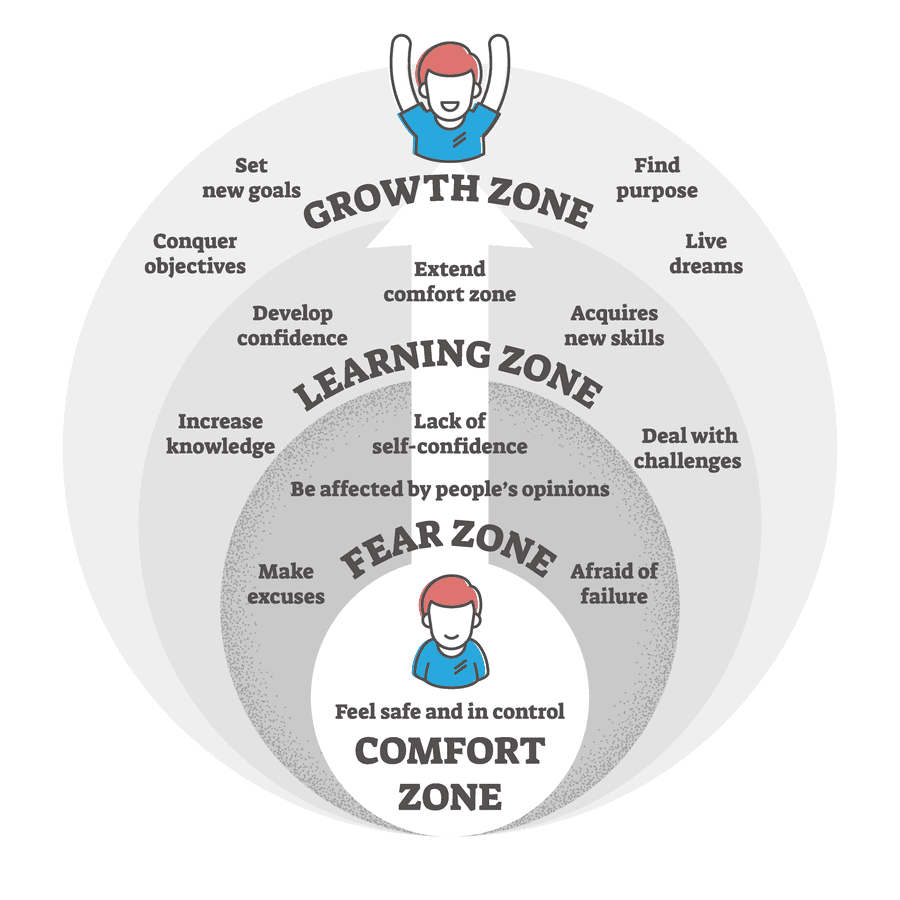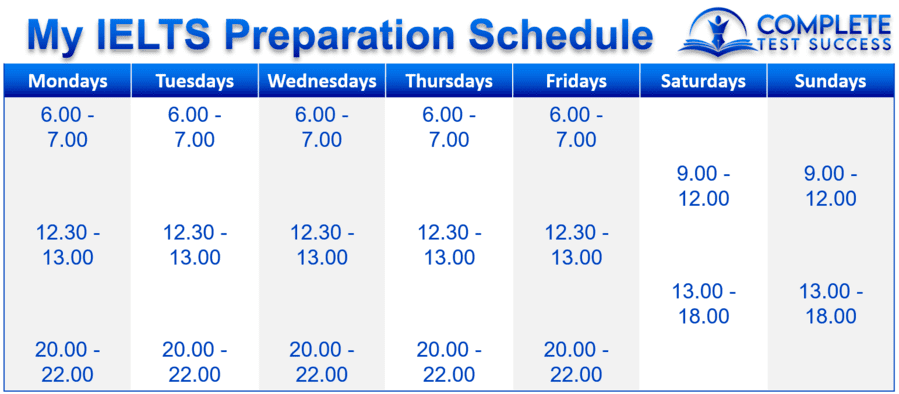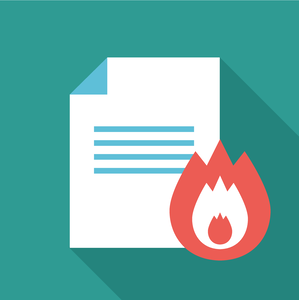How To Prepare for IELTS at Home (7 Steps)
If you don’t know how to prepare for IELTS at home, you’ll waste a lot of time doing things that won’t help to improve your score.
In this lesson, we’ll go through the various aspects of IELTS preparation to make sure every second you study contributes to your IELTS score.

Contents;
- The Basics of Mastering IELTS
- Move Beyond the Fear Zone
- Organise Your Time
- Remove Distractions
- Decide What to Study
- Only Use Reliable Materials
- Don’t Book the Test Until You’re Ready
Prefer to watch the video version?
How To Prepare for IELTS at Home: Step #1 – The Basics of Mastering IELTS
You need to be strategic about how you approach your IELTS preparation.
Firstly, you need to learn about the different parts of the IELTS test and what you need to do for a high score in each part.
This is exactly what the Complete Test Success website is designed to help you with.

After that, you practise doing the IELTS Reading, Writing, Listening and Speaking Tests.
Eventually, you’ll get to the point that you can’t improve any further by yourself.
This is the perfect time to get an IELTS expert to point out your main weaknesses.
In my free group lessons, I can explain what your main weaknesses are. Click here to sign up.
Once you know your main weaknesses, focus all your attention on improving those things and don’t worry about anything else.
After you’ve made the necessary improvements, find out your new main weaknesses and repeat the process.
How To Prepare for IELTS at Home: Step #2 – Move Beyond the Fear Zone
The first obstacle to improving your IELTS scores is the Fear Zone.

IELTS students in the Fear Zone make excuses such as;
- I’m not good at learning languages.
- The IELTS test isn’t fair.
- If I didn’t have to mind my children, I could do it.
- If I wasn’t busy at work, I could do it.
- If I fail, I can do the test another time.
These excuses are only useful if you plan to fail the test because you can use them when explaining why you failed to your friends and family members.
If you plan to be successful, you must stop looking for easy ways to improve, stop making excuses and start doing what’s required to improve your scores.
The steps below are designed to help you with this.
How To Prepare for IELTS at Home: Step #3 – Organise Your Time
Getting the IELTS score you need is incredibly valuable because it can improve you and your family’s lives.
However, IELTS preparation isn’t fun, so you mustn’t wait until you’re in the mood before you start studying.
Instead, you must organise your time so that you can force yourself to study for as many hours as possible.

i. Free up Your Time
You might feel like you don’t have enough time to study for the IELTS test.
But it’s likely that you’re busy doing something less important than preparing for your IELTS test.
This is why you must avoid less essential tasks and prioritise your IELTS preparation.
Busy at Work
If you’re busy at work, you might need to reduce your hours or take time off.
In fact, I’ve had students who quit their jobs to prepare for the IELTS test because they were going to leave as soon as they got their scores anyway.

Busy with Housework
If you’re responsible for all of the cooking and cleaning in your house, you need to ask your family to help until you’re finished your IELTS preparation.
Test Day is Too Soon
If your test day is coming up and you know that you don’t have enough time to get ready, you can delay your test until a later date.
Too Tired
Maybe you already have some free time, but you’re always too tired to study.
Analyse why this is the case. For example, are you tired because you have a bad diet, do no exercise or stay up too late?
Are you studying after work when you’re exhausted instead of before work?

Think about why this is happening and take whatever action is necessary to resolve the situation.
ii. Make a Schedule
You need to physically write down the times at which you’ll study each day.
Once you’ve written it down, you’ll feel more obliged to follow it.
Even better, put the schedule somewhere in your home where everyone can see it because that will make you more accountable.
Here’s an example of a student who studies before work, at lunchtime and before bed during the week but has a different schedule at the weekend.

How To Prepare for IELTS at Home: Step #4 – Remove Distractions
If you’re constantly getting interrupted during your IELTS preparation, your progress will be much slower.
To help with this, put your phone on silent, ask the people you live with not to disturb you and make sure that nothing else can interrupt you while studying.
If you get distracted by social media platforms or other websites, you can use the apps here to limit your access until later.

How To Prepare for IELTS at Home: Step #5 – Decide What to Study
When you start your IELTS preparation each day, you must first decide what you’ll study.
Making this decision ensures that you have a clear purpose so that you can use your time effectively.
Here is some advice to help you decide.
i. Don’t Overload Yourself
You may need to improve many aspects of the IELTS test and your English ability.
However, your progress will be slow if you try to improve everything at the same time.
Instead, choose one or two things to work on and stick with them until you’ve made the necessary improvements.

If you’ve done the IELTS test before, start with the component that had the lowest score. If not, start with the one you’re most concerned about.
ii. Choose Something Specific
You can’t focus on IELTS or even IELTS Writing because those topics are too broad.
Instead, you must choose something more specific.
So if you’re working on IELTS Writing, decide if you’re going to study Task 1 or Task 2.
If you choose Task 2, now you must narrow it down to Task Achievement, Coherence & Cohesion, Lexical Resource or Grammatical Range & Accuracy.

Then decide on an even more specific aspect of one of those.
If you’re studying Task Achievement, you might want to focus on generating ideas, explanations or examples.
For vocabulary, you’ll need to make sure that you’re working on a common IELTS topic that you’re not already familiar with.
Or, if you’re studying grammar, you can work on a specific grammar mistake that you regularly make.
iii. Consider How Your Actions Improve Your Scores
It’s very easy to waste hours on our IELTS preparation without making any improvements.
For example, we could spend all our time watching IELTS videos on YouTube but learn nothing new.
This is why we must ask ourselves what benefit we’re getting from our actions.

Here are two common examples of how IELTS students waste their time by not considering this.
Watching Speaking Test Videos
Videos of IELTS Speaking tests, like the one here, are very popular.
But, how can watching someone else’s speaking test improve my speaking scores?
Well, I can listen to the examiner’s question, pause the video, give my own answer, listen to the answer in the video and compare it with my performance.
However, if I just watch the video, I get no benefit.
Writing Lots of Essays
Writing IELTS answers is an essential part of preparing for the IELTS test, but it doesn’t solve every issue.
For example, if my main weakness is that I can’t generate appropriate main ideas, I should plan lots of answers instead of writing entire essays.

That will mean that all of my time is spent generating ideas instead of just 5 minutes before I write an essay.
iv. Remember that IELTS is an English Test
Of course, you must understand how the IELTS test works and what to do in each part of the test.
But for most students, the majority of their IELTS preparation needs to be spent improving vocabulary, grammar, fluency and/or pronunciation.
Until you have the required language ability, focusing solely on how to do the IELTS test will not get you the scores you need.
How To Prepare for IELTS at Home: Step #6 – Only Use Reliable Materials
I have seen countless students ruin their chances of a good IELTS score because they used unreliable materials.
Here’s how this can affect each part of the test.
IELTS Reading and Listening
If you use fake practice reading and listening tests, the format of the questions and the content might be different from what you’ll get in the real test.
Even more problematic is that the scores you get in these fake tests won’t reflect the scores you’re really capable of.
So, unless you use the practice tests published by Cambridge, you might think that you’re capable of a higher score than you really are.

IELTS Writing
The concern here is that you’ll get inaccurate advice about writing your answers, reducing your Task Achievement and Coherence & Cohesion scores.
IELTS Speaking
Using unreliable materials for the IELTS Speaking test isn’t too much of a concern because this part of the test is pretty straightforward.
How To Prepare for IELTS at Home: Step #7 – Don’t Book the Test Until You’re Ready
You won’t get the scores you need until you understand what to do in each part of the IELTS test and have the appropriate English level.
It’s really as simple as that.
If you do the IELTS test before you’re ready, you won’t get your scores, but you’ll succeed if you make all the necessary improvements first.

To know if you’re ready or not, you’ll need to support of an IELTS expert, and luckily for you, I can help you in my free Live Feedback Lessons.
What now?
Well, it’s time to get started on the next stage of your IELTS preparation.
Now that you know how to prepare for IELTS at home, you need to organise your time, focus on your weaknesses and only use your time for things that really will help you to get a higher score.
